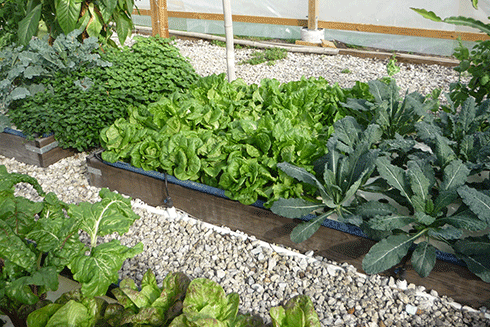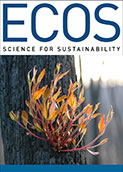
|
Published: 25 August 2014
Consumers ‘taking a big bite out of the earth’
Every meal served costs the planet 10 kilos of soil, 800 litres of fresh water and 1.3 litres of diesel fuel, according to respected science communicator and author, Julian Cribb.

|
|
An Aquaponics grow bed, one of the developing food production systems that may play a larger role in future food production. Credit: US Department of Agriculture
|
‘That’s what it takes to feed the typical person for just one meal – and when you multiply it by 7.2 billion people each eating around a thousand meals a year, our modern food system is devouring a vast amount of resources unsustainably,’ said Mr Cribb, author of The Coming Famine: the global food crisis and how we can avoid it.
‘Eating is our largest personal impact on the planet – but few people appreciate how big it is.
‘The world currently loses around 75 billion tonnes of topsoil a year. Despite progress in some countries, global soil degradation is getting worse, not better. At such rates, scientists are warning we could run short of good farming soils within 50–70 years.’
Mr Cribb says the picture is similar for water, with more than 4000 cubic kilometres of groundwater being extracted – most of it unsustainably – every year. Places such as north China, the Indo-Gangetic region, the Middle East and Midwest USA face critical water shortages by the 2030s.
Meanwhile, he adds, huge cities and gas companies are grabbing the farmers’ remaining water – making the task of feeding the world so much harder.
‘Most governments and consumers fail to recognise that scarcities of water, land, oil, nutrients, technology, fish and finance are now acting in sync – and being amplified by climate shocks.
‘Equally important is the fact that 3 out of every 4 people in affluent societies now die from a diet-related disease.
‘This pandemic of preventable disease now consumes three-quarters of our exploding healthcare budgets.
‘So there are two major reasons to radically change the world diet – health and sustainability.
‘There are huge opportunities for new foods, new production systems and novel diets which are healthier and more sustainable as well as delicious.
‘Currently humanity consumes just a few hundred different plants: the modern diet is largely based on just five grains and five animals.
‘Yet there are 27,600 edible plants on Earth, mostly vegetables and most of them unknown to the majority of people.
‘We have not yet begun to explore the horticultural, health and culinary potential of our home planet – and now is the perfect time to do so.
‘I predict that over the coming two decades, this will lead to a major boom in horticulture, both in the cultivation of thousands of novel crops, in the development of new production systems such as aquaponics, biocultures and algae culture and green cities, and in the design of new foods and diets.
‘This will be driven in part by climate change, which will make the production of grain-based agriculture and the livestock sectors that depend on it increasingly erratic, globally.
‘But it will also be driven by a worldwide demand from consumers for lighter, fresher, healthier, more sustainable and more local foods.’
Source: International Horticultural Congress 2014



